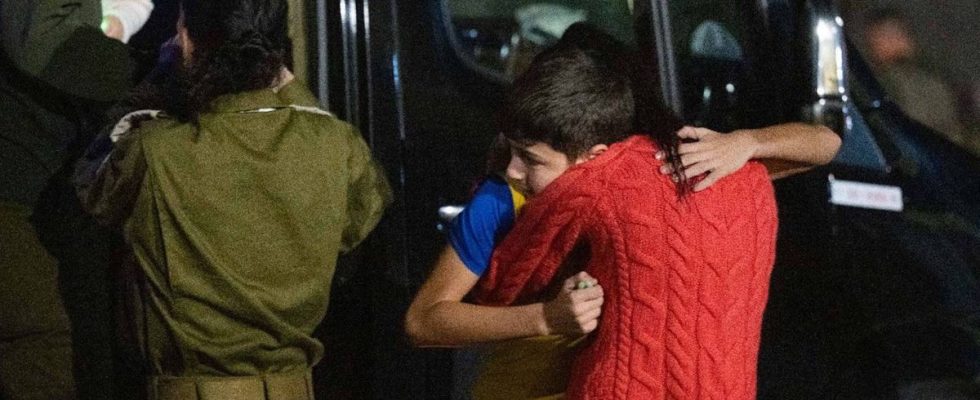Published on
Updated
Reading 3 min.
in collaboration with
Hélène Romano (Doctor in psychopathology)
Three French-Israeli minors captured on October 7 and held since then in the Gaza Strip were among the hostages released by Hamas on Monday evening. What is the psychological impact of such an event? Can they recover? We asked Hélène Romano, a psychotherapist specializing in psychotrauma, the question.
Their names are Eitan Yahalomi, Erez and Sahar Kalderon, they are respectively 12, 12 and 16 years old and appeared yesterday among the hostages released during the truce in the conflict between Israel and Hamas in the Gaza Strip. Three Franco-Israeli minors who were able to reunite with their families after 52 days of captivity. How do we recover from such an event?
52 days of trial and terror away from their families
This young boy, this brother and this sister were kidnapped on October 7 from Kibbutz Nir Oz, very close to the Gaza Strip.
Just like the other hostages, their story is chilling: young Eitan was captured while his mother and sister managed to escape. His father is still missing. In the case of Erez and Sahar Kalderon again, the release has a bitter taste: their father is still in the hands of Hamas according to their lawyer. Other members of their family were found dead.
Their conditions of detention also remain unclear: families find them emaciated, and it is assumed that they spent a lot of time hidden in the dark. Young Eitan’s aunt also spoke on the microphone of BFMTV that his nephew had been beaten and forced to watch videos of the abuses committed on October 7. A horror that ended, officially, last night.
In what state can these children find themselves in such a context?
What can be the psychological impact on children in a context of war and hostage taking? Hélène Romano, psychotherapist specializing in psychotrauma and author of The child and the war, at Odile Jacob, explains to us that it is difficult to know exactly what the damage is to these children.
“There is no one today who can claim to know how they are doing, despite their smiles which serve to reassure parents. We can only base ourselves on past studies (on children who survived the Shoah, on the killings of masses in Rwanda, Ukraine, etc.) to know that what everyone experiences is different. In this conflict, we have children too young to be able to speak, older children who have seen their lives destroyed (home, school), who have witnessed atrocities, or who were only on vacation… Everyone’s experience is different, and there are as many possible reactions as there are children. The only thing we generally know is that the psychological impact is all the stronger and more violent if the child cannot be made safe as soon as possible.”
The priority in this case is to think about the temporality of the trauma, explains our expert. Initially, it is important to check the health, injuries, nutritional status of the children. “We don’t think much about it but it’s also about allowing them to wash and change clothes which still bear the scars of their condition.”
Then, the objective of caring for an abducted child also comes down to reassuring him, protecting him, and allowing him to put words into words, but without ever forcing him. “It can take months, through drawing, modeling clay, a punching bag… Because the words don’t come out. But how can you tell in words that you saw your mother being murdered or raped?”
But care must above all be attentive to one element according to Hélène Romano: “These children must not become trophies, or just victims. They need to be considered as children, traumatized of course, but without freezing them in horror.”
Is it possible to hope for resilience for these children? A life after the tragedy?
“History lets us know that children facing atrocities and wars survive. And fortunately! But resilience is a buzzword that can be dangerous. It’s not a band-aid word that has to say ‘ everything is fine now’. If resilient means coping, taming the trouble, knowing that I am no longer alone, yes, resilience for these children is possible. If resilient means ‘we repair and we forget’, no, it “It’s not possible. We don’t forget the atrocities, but we can live with this scar.”
